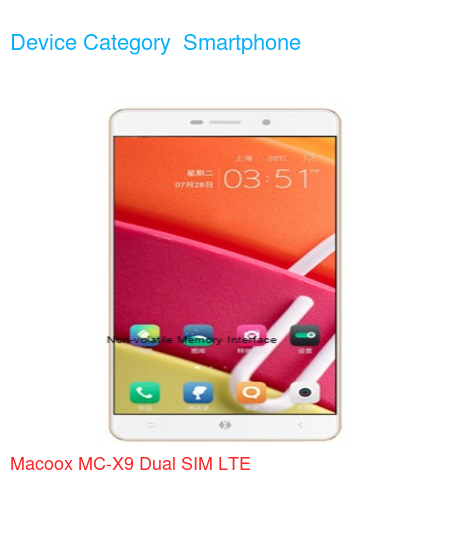| Brand | Macoox |
| Model | MC-X9 Dual SIM LTE |
| Released | 2015 Aug |
| Device Category | Smartphone |
| Depth | 7.2 mm |
| Platform | Android |
| Operating System | Google Android 5.0 (Lollipop) |
| CPU Clock | 1300 MHz |
| CPU | MediaTek MT6735, 2015, 64 bit, quad-core, 28 nm, ARM Mali-T720 GPU |
| RAM Type | LPDDR3 SDRAM |
| RAM Capacity (converted) | 2 GiB RAM |
| Non-volatile Memory Interface | Yes |
| Non-volatile Memory Capacity (converted) | 16 GB ROM |
| Display Diagonal | 139.7 mm |
| Resolution | 1080×1920 |
| Pixel Density | 401 PPI |
| Display Type | Color IPS TFT LCD display |
| Number of Display Scales | 16.8M |
| Scratch Resistant Screen | No |
| Graphical Controller | ARM Mali-T720 |
| A/V Out | No |
| Microphone(s) | mono |
| Loudspeaker(s): | mono |
| Audio Output: | 3.5mm |
| Supported Cellular Bands | GSM900 , GSM1800 , GSM1900 , TD-SCDMA2000 , TD-SCDMA1900 , TD-LTE2600 (B38) , TD-LTE1900 (B39) , TD-LTE2300 (B40) , TD-LTE2500 (B41) bands |
| Supported Cellular Data Links | GPRS , EDGE , TD-SCDMA , TD-HSDPA , LTE , LTE 150/50 data links |
| SIM Card Slot | Micro-SIM (3FF) |
| Complementary Phone Services | Voice transmission , Voice speaker , Vibrate , Speakerphone |
| Dual Cellular Network Operation | Dual standby |
| Sec. Supported Cellular Networks: | GSM900 , GSM1800 , GSM1900 |
| Sec. Supported Cellular Data Links: | GPRS , EDGE |
| Sec. SIM Card Slot | Micro-SIM (3FF) |
| Touchscreen Type | Capacitive multi-touch screen |
| Expansion Interfaces | TransFlash , microSD , microSDHC |
| USB | USB 2.0 |
| USB Services | USB charging , USB Host , USB OTG 1.3 , USB PD |
| USB Connector | USB Micro-AB |
| Bluetooth | Bluetooth 4.0 |
| Wireless LAN | 802.11b , 802.11g , 802.11n |
| Wireless Services | Wi-Fi Tethering |
| FM Radio Receiver | FM radio (88-108 MHz) |
| Complementary Satellite Services | A-GPS , Geotagging , QuickGPS |
| Camera Placement | Rear |
| Camera Image Sensor | CMOS |
| Number of effective pixels | 12.8 MP camera |
| Zoom | 1.0 x optical zoom |
| Focus | CD AF |
| Video Recording | 1920×1080 pixel |
| Flash | single LED |
| Camera Extra Functions | HDR photo , Macro mode |
| Aux. Camera Image Sensor | No |
| Aux. 2 Camera Image Sensor | No |
| Aux. 3 Camera Image Sensor | No |
| Aux. 4 Camera Image Sensor | No |
| Secondary Camera Placement | Front |
| Secondary Camera Sensor | CMOS |
| Secondary Camera Number of pixels | 5.0 MP sec. cam |
| Secondary Video Recording | 1920×1080 pixel |
| Sec. Aux. Cam. Image Sensor | No |
| Built-in compass | Yes |
| Built-in accelerometer | Yes |
| Additional sensors | L sensor , P sensor |
| Protection from solid materials | Yes |
| Protection from liquids | Yes |
| Battery | Li-ion polymer (LiPo) |
| Nominal Battery Capacity | 2650 mAh battery |
| Market Countries | China |
| Mobile Operator | China Mobile Limited |
| Added | 2024-06-26 |
Specifications data description of this 📱Macoox MC-X9 Dual SIM LTE📱
Title: The Ultimate Specification Guide for Your Device 🌐📅🏋️🌈🤖🛠️🚀🔧💪🖥️🎮🗂️📷🎥🔈📡💡🎁🔋🔌
Introduction:
Welcome to our comprehensive guide on the ultimate device specifications! In this post, we’ll take a deep dive into the different components that make up your device, from the chipset to the battery, and everything in between. Whether you’re looking to upgrade your current device or simply want to learn more about the technology you use every day, you’ve come to the right place. So, let’s get started! 🚀
Lineup:
In this guide, we’ll be covering a range of devices, from smartphones to laptops, and everything in between. No matter what type of device you’re interested in, you’ll find all the information you need right here. So, whether you’re a fan of Apple, Samsung, or any other brand, you’ll find the specs you need to make an informed decision. 📅
Design:
When it comes to devices, design is just as important as specs. That’s why we’ll be taking a close look at the design of each device, including its size, weight, and build materials. From sleek metal bodies to durable plastic, we’ll cover it all, so you can choose a device that not only performs well but also looks great. 🏋️
Specifications:
Now, let’s get to the heart of the matter – the specs! Here’s a rundown of what we’ll be covering:
🌐 Network: We’ll take a look at the different network capabilities of each device, including 4G, 5G, Wi-Fi, and more.
📅 Launch: We’ll provide information on when each device was launched, so you can see how it stacks up against the competition.
🌈 Display: We’ll cover everything from resolution and aspect ratio to refresh rate and brightness.
🤖 OS: Whether you’re an iOS or Android fan, we’ve got you covered.
🛠️ Chipset: From Qualcomm to Apple, we’ll take a look at the different chipsets used in each device.
🚀 Chipset Speed: We’ll provide details on clock speed, cores, and more, to help you understand just how fast each device is.
🔧 CPU: From single-core to octa-core, we’ll break down the number of cores and clock speeds for each device’s CPU.
🖥️ GPU: We’ll take a look at the different graphics processors used in each device, including their clock speeds and capabilities.
🗂️ Memory: From RAM to ROM, we’ll cover it all.
📷 Camera: From megapixels to aperture, we’ll take a close look at the cameras used in each device.
🎥 Video Recording: We’ll provide information on each device’s video recording capabilities, including resolution, frame rate, and more.
🔈 Sound: From speakers to microphones, we’ll cover everything you need to know about the sound capabilities of each device.
📡 Connectivity: We’ll take a look at the different connectivity options for each device, including Bluetooth, NFC, and more.
💡 Features: From water resistance to biometric sensors, we’ll cover all the unique features of each device.
🎁 Software: We’ll provide details on the different software features of each device, including operating system updates, bloatware, and more.
🔋 Battery: From capacity to charging speed, we’ll cover everything you need to know about the batteries used in each device.
🔌 Charging: We’ll take a look at the different charging capabilities of each device, including wireless charging and fast charging.
Conclusion:
And there you have it – a complete guide to the ultimate device specifications! We hope you’ve found this post helpful and informative. Now that you know all about the different components that make up your device, it’s time to make a decision. But before you go, we’d love to hear from you! Leave a comment below and let us know what you think.














